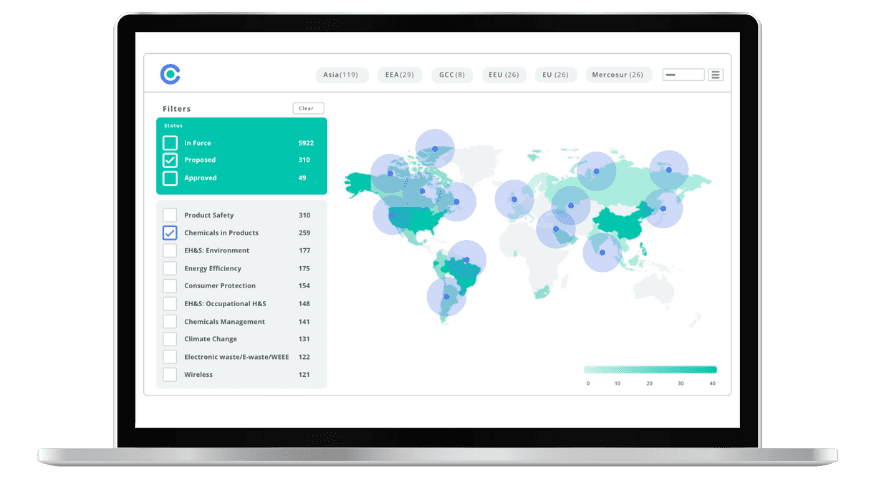
EFRAG Unveils Final Digital Taxonomy for ESRS Set 1 and Article 8 Disclosures of Taxonomy Regulation

This blog was originally posted on 11th September, 2024. Further regulatory developments may have occurred after publication. To keep up-to-date with the latest compliance news, sign up to our newsletter.
AUTHORED BY CELIA LE LIEVRE, SENIOR REGULATORY COMPLIANCE SPECIALIST, COMPLIANCE & RISKS
Introduction
On 30 August 2024, the European Financial Reporting Advisory Group issued the final XBRL Taxonomy for the first set of European Sustainability Reporting Standards (ESRS) and the XBRL Taxonomy for Article 8 disclosures under the Taxonomy Regulation (Regulation (EU) 2020/852). The need to establish a digital taxonomy for the ESRS stems from the Corporate Sustainability Reporting Directive (CSRD).
Dive into the details of the Digital Taxonomy in our blog below.
Overview
By way of reminder, the Corporate Sustainability Reporting Directive (CSRD) requires large EU companies, parent companies of large EU groups and all small and medium-sized listed companies (except listed micro-enterprises) to disclose information on what they see as the risks and opportunities arising from social and environmental issues, and on the impact of their activities on people and the environment. Non-EU companies are also subject to mandatory reporting if they generate over EUR 150 million on the EU market. The disclosures must be prepared in accordance with the ESRS and included in a sustainability statement which must occupy a dedicated section of the company’s management report or consolidated management report of parent companies.
As per the CSRD, the management report shall be prepared in the Extensible Hypertext Markup Language (xHTML) format with Inline XBRL tags, as specified in Delegated Regulation (EU) 2019/815 on the European Single Electronic Format (ESEF Regulation). Moreover, the sustainability statement within the management report, including the disclosures provided for in Article 8 of the Taxonomy Regulation, must be marked-up or tagged in accordance with the Digital Taxonomy.
The Digital Taxonomy aims to facilitate access to and comparability of reported sustainability information by making sustainability statements digitally accessible and machine readable. To advance the digitalization of sustainability reports, EFRAG was tasked with developing the digital XBRL taxonomy for the first set of ESRS and Article 8 disclosures. A preliminary draft of the XBRL Taxonomy was released for public consultation on February 8, 2024. The final Taxonomy was then published on 30 August 2024. The XBRL Taxonomy proposed by EFRAG will enable the marking up (‘tagging’) of sustainability statements by providing XBRL elements (or interactive data tags) for every data point defined in the ESRS with the use of specialized software’s. The interactive “digital” tagging of reported data against the ESRS will make it easier for regulators and investors to extract key information from the reports and to compare them with the results of previous years or performance of other companies. The XBRL format was chosen by EFRAG as it is used by other EU and international organizations to develop digital taxonomies for financial and sustainability-related disclosures. A special XBRL software will be necessary to open the management report in a XBRL format.
The Digital Taxonomy will inform the development of Regulatory Technical Standards (RTS) for tagging the ESRS sustainability statement. The RTS are to be introduced by way of an amendment to the ESEF Delegated Regulation. Note that companies are not required to tag their sustainability statements until the digital tagging of ESRS is finalized as part of the ESEF RTS.
The XBRL taxonomy packages are accompanied by the “Explanatory Notes and Basis for Conclusions” to explain the methodology and illustrate the resulting reporting in machine-readable format. For more information, you can view the press release on the EFRAG website.
Stay Ahead Of Regulatory Changes Like EFRAG’s Digital Taxonomy
Want to stay on top of regulatory developments like EFRAG’s Digital Taxonomy?
Our ESG Solution is a smarter way for organizations to stay on top of the evolving ESG Regulations, & keep ahead of proposed changes before they happen.
- ESG Regulatory Content Coverage across 8 broad ESG content areas covering 45 sub-areas – ESG Reporting, Human Trafficking & Slavery, Climate Disclosures, Human Rights – Affected Communities, Labor & Employment, Supply Chain Due Diligence, Sustainable Resource Use, Anti Bribery & Corruption.
- We empower the ESG & Sustainability leadership to demonstrate to your board and investors that you have robust ESG controls in place to effectively navigate the regulatory landscape.
- Future-Ready Technology: We provide precise ESG legal requirements for today and tomorrow, and identify future risks, enabling you to prioritize the most impactful ESG initiatives.
- Integrated Compliance: Our ESG technology solution integrates both Corporate Compliance and Product Compliance, making us the global leader in this combined approach.

ESG 2023: A Year in Review
Our whitepaper summarizes the ESG regulatory landscape in 2023, reviewing the key regulations proposed, published and/or entered into force.


